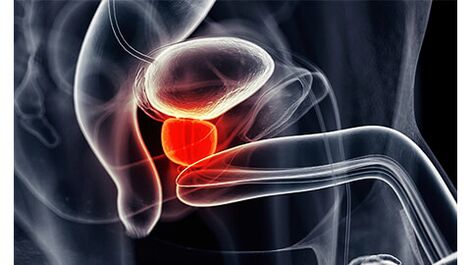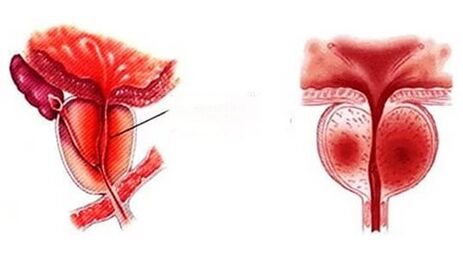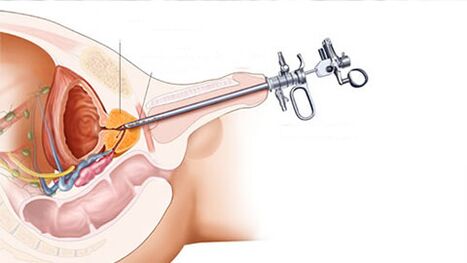
Chronic prostatitis is a slow prostate disease.For him, as in any other chronic pathology, it is characterized by changes in periods of aggravations and remission.The disease develops slowly without causing almost no anxiety in the early years to the patient, except for the only symptoms that are often not observed.However, the progress of pathology involves violation of the function of the prostate gland and the development of complications, so it is important to identify it at an early stage.
At the on -site clinic, you can perform a preventive examination of the urologist.If necessary, an individual treatment system is developed for you, thanks to which you will get rid of the disease in a short period of time and avoid complications.
The characteristics of the disease
Chronic prostatitis of men is one of the most common pathologies of the gangiturinary system.Patients are approx.30% suffer from the age of 20-50.
The prostate is a non -parallel organ located under the bladder.Responsible for the quality of sperm: it creates a special secret that is an important element.And during the erection, the prostate iron closes the bladder exit.
The development of acute and chronic prostatitis is often the cause of infections (bacterial, viral or fungal origin).They are able to penetrate the prostate through blood, lymphatic, even if the prostate is far from the focus of the infection.In addition, the infection often falls directly into the prostate gland from the urethra.These two organs are connected: the prostate channels are open to the urethra.And the prostate giving the initial part of the urethra through the gland.

Infection can be listed in the prostate, even without pathological processes in the body.After all, each organ is characterized by its own microflora.Microorganisms in the urethra are harmless in their "habitat".However, in the case of prostate gland, they may be alien, and if they are involved, they can provoke the development of inflammation.
Prostatitis can be:
- Infectious origin - caused by bacteria, viruses or fungi.
- Stantant in nature - develops with stagnation of prostate secretion.
Causes of the development of the disease
The causes of development depend on the form of chronic prostatitis.The infectious form occurs in the following diseases:
- Urethra.
- Orchitis (testicles pneumonia).
- Bladder inflammation.
The source of infection does not need to be placed in the immediate vicinity of the prostate.Pathology can occur in the background of other infections that pass in the body: caries, sinusitis, pneumonia, bronchitis, etc.
In addition, chronic prostatitis can develop as a result of the unequal acute process of bacteria.
The stagnation of prostate gland secretion is due to blood stagnation in the pelvic organs, which may be consequences:
- Irregular sex life.
- Sedimentary.
- Wears a tight lingerie.
- Bad habits (alcohol consumption, smoking).
The stagnant form is located in 85% of chronic prostatitis.
Factors that increase the risk of developing both form of disease are as follows:
- Regular microtrauma, bruising of the pelvic organs.
- Inadequate nutrition.
- Nervous overloads.
- The fault of sex life.
- Hypothermia and in a long -term environment with increased moisture.
These factors or cause blood supply to the pelvic organs or increase the possibility of infection into the prostate gland.
Diagnosis of chronic prostatitis is made more often by representatives of some professions than people of different activity.The risk group includes:
- Trucks and other drivers (for a long time forced to be in the same position).
- Programmers, office workers (sitting lifestyle).
- Fishermen (stay in the cold for a long time).
- Professional athletes: football, wrestlers, volleyball players, basketball players (often the risk of injury in the pelvis area).
- Seamers and geologists (disadvantaged weather conditions: cold, wet).
Chronic prostatitis: symptoms

Symptoms of chronic prostatitis:
- Pain at the foot, in the lower abdomen: they can be given to the rectum, the sacrum.
- Erection disorders, premature ejaculation, lack of ejaculation.
- Urine disorders: often the desire for urination, difficulties in bladder emptying, pain during urination.
In the early stages of chronic prostatitis, the symptoms are weak.The pains are insignificant and pass.Urine disorders are also irregular.Therefore, the patient often does not give these symptoms to these symptoms and does not consult the doctor.Even if the signs of the disease are clearly expressed.
Even if there are rare symptoms to seek medical attention, the disease can lead to complications.
Complications of chronic prostatitis
The presence of a constant focus of infection can spread to other organs and lead to pathologies.Complications of chronic prostatitis:
- Cystitis is inflammation of the bladder.
- Pyelonephritis - purulent kidney inflammation
- Veiculite - inflammation of seed bubbles.
- Orchoepididymitis - inflammation of the testicles and their appendices.
However, inflammatory diseases of the Genitourinarinal System are capable:
- To infertility.
- Prostate cancer.
- For adenoma prostate.
Reference!In chronic prostatitis, erection dysfunction often develops.The reason for this is that the nerves responsible for erection pass through the prostate gland.When a pathological process develops, it is often affected.
Diagnosis
You have to visit the disease to identify the disease.First, the doctor collects anamnesis: he listens to complaints and asks questions.It then performs the visual check and finger inspection of the prostate.In addition, the following types of research may be required:
- Bacteriological examination of urine.
- Microscopic examination of prostate gland secretion.
- Ultrasound of the prostate.
- Spermogram.
- Smear from the urethra (to identify sexual infections).
- Prostate biopsy.
Treatment of chronic prostatitis
Treatment of chronic prostatitis is primarily conservative.Surgery is performed only if the treatment does not give the necessary result or complications have been raised:
- The abscesses of prostate or surrounding tissues.
- Prostate cancer.
- Prostate adenoma.
- Severe pathologies of the urethra.
Conservative treatment includes the appointment:
- Medicines: non-steroidal anti-inflammatory drugs, antibiotics, alpha blockers, immunomodulators, drugs, accelerating regeneration.For severe pain, medication can be prescribed.
- Prostate massage.It allows you to eliminate stagnant phenomena, improve your blood circulation in the affected area and the outflow of prostate gland secretion.However, further tests are performed before the massage is prescribed, as it may exacerbate the condition under certain circumstances.
- Physiotherapy procedures.Most often prescribed: magnetic therapy;electrophoresis;laser therapy;Ultrasound therapy.
- Diet.It helps to eliminate the risk of worsening inflammation, improve the digestive system, increase immunity, reduce internal organs, and normalize blood circulation throughout the body.In the oven, cooked, cooked or baked, eat with minimal salt, steamed, cook or bake.The diet of chronic prostatitis is based on low fatty fish, lean meat (chicken, turkey, rabbit, beef), cereals, vegetables, macaron products from whole grain flour and light soups.It should be excluded: fried, spicy, greasy, smoked, salted foods, canned food, semi -prepared products, fast food restaurants, mushrooms, spices, including onions and garlic, citrus fruits, legumes and cabbage, greasy meat, strong tea, alcohol, carboned drinks, sweets and concrete baking.
- In severe cases, surgical treatment is performed. Transuretral resection of the prostate gland - the removal of the pathological site or the entire prostate is carried out without cuts (the device is introduced through the urethra), most often for the formation of prostate adenoma.Prostatectomy - Removal of the prostate or its area at the usual surgery by implementing sections.

To prevent chronic prostatitis
In order to prevent the disease, it is important to eliminate the focus of infection in the body in a timely manner.The benefits of regular sex life will be except for random relationships.A healthy diverse diet and moderate physical activity enhance immunity.Hypothermia, extended sessions (if you require work, take a break and choose) will close the lingerie.It is important to prevent the urologist from examining annually.
































